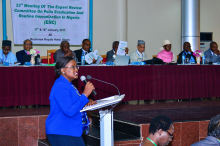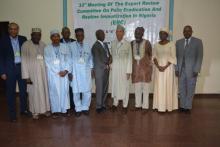Polio Eradication Experts Task Government on Prioritizing Children in Inaccessible Areas
Abuja, 19 January 2017 - Experts are calling on government to galvanize partnerships aimed at reaching children in inaccessible areas, having identified that Nigeria’s polio resurgence in August 2016 was largely due to insecurity in northeastern Nigeria and waning political commitment. Their collective agreement hinged on the firm belief that interrupting transmission of polio requires processes focused on reaching children in inaccessible areas, providing timely and adequate resources.
The 33rd Session of the Expert Review Committee on Polio Eradication and Routine Immunization (ERC) was held in Abuja on 17-18 January 2017.
Technical presentations highlighted achievements, challenges including funding gaps in 2017, and opportunities. Therefore, the ERC Chairperson and renowned Virologist, Professor Oyewale Tomori informed delegates at the ERC session that “we must be bold enough to let government know where we stand on issues of security and funding”
To this end, the doyens of polio eradication consequently asked government to urgently convene the Presidential Task Force and intensify engagement with the military, civilian Joint Task Force (cJTF) as well as other security formations. The aim is to provide effective security support to vaccination teams to facilitate the implementation of innovative strategies to reach children in inaccessible areas, such as the Reaching Every Settlement Initiative in Borno state.
ERC’s preliminary recommendations
Meanwhile, the ERC highly acknowledged the rapid, aggressive and unprecedented efforts by thousands of health workers, community volunteers, traditional leaders and partner agency staff in responding to the recent wild polio virus (WPV) and circulating vaccine derived polio virus (cVDPV) outbreaks under very complex circumstances.
However, to address issues around populations living or trapped in inaccessible areas, ERC recommended that the Nigeria programme adopts the recent innovation using satellite imagery and extend vaccinator-tracking system (VTS) to estimate the inaccessible population size.
ERC also gave recommendations to enhance surveillance in the inaccessible areas, internally displaced persons (IDPs) camps and other high-risk populations. Specifically, the committee pointed the need to carefully map settlements, track movement of IDPs, ensure high quality active surveillance and campaigns in formal and informal camps as well as monitor the progress through regular data analysis.
Dr Pascal Mkanda the Coordinator of Polio Eradication Programme at the World Health Organization (WHO) Africa Regional Office presented the recommendations of the 33rd session of ERC at plenary.
“We will finish polio”- new ES pledges
Attending the ERC for the first time in his capacity as the new Executive Secretary (ES) of the National Primary Healthcare Development Agency, Dr Shuaib Faisal acknowledged the ERC’s phenomenal support over the years. He pledged that , “we will not only finish polio transmission but we will do it this year as we intend to walk our talk with a singular purpose of eradicating polio and getting Nigeria out of endemic status”.
According to the ES, his tenure will be characterized by increased collaboration with the military; greater partnerships across different social strata; and undiluted emphasis on quality data sources that will credibly guide programmatic intervention and aim for transparency.
The ERC and partners that include WHO, UNICEF, BMGF, CDC, USAID, Canada, JICA, Rotary International and World Bank generally applauded government for the resounding response to the 2016 polio outbreaks.
______________________________________________________
For more information, please contact:
Technical contact:
Dr Fiona Braka; Tel: +234 703 170 5252; Email: brakaf [at] who.int " target="_blank"> brakaf [at] who.intbr /> Media contact:
Ms Charity Warigon; Tel: +234 810 221 0093; Email:
warigonc [at] who.int" target="_blank"> warigonc [at] who.int
Below:
01. ERC chairperson, Prof. Tomori (5th from right)) and other members
02. Dr Fiona Braka, WHO Nigeria EPI Team Leader delivering the presentation on quality of polio outbreak response





